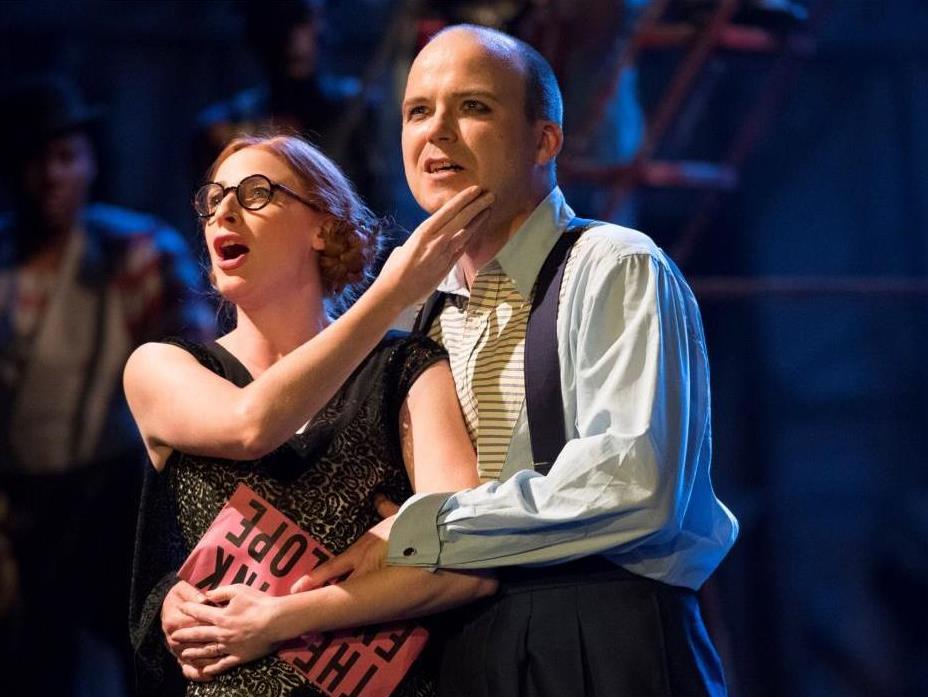The Threepenny Opera by Bertolt Brecht and Kurt Weill. Image via National Theatre Live.
‘A play for a city that has lost its morality’; in this case the city is an imaginary London, in the days of the Belle Epoque – or the 20s or the East End of the 50s. ‘This is a cheap opera.’ National Theatre Live’s production of The Threepenny Opera (music by Kurt Weill, text by Bertold Brecht) opens with these words and with the famous Mack the Knife overture sung by George Ikideashi (who we see occasionally in Melbourne as drag diva Le Gateau Chocolat). Adapted by Simon Stephens, this show honours Brecht’s intention to ‘make theatre as popular as football, meeting with approval from both the Brecht and Weill Estates. In 1928 Brecht and Weill repurposed The Beggar’s Opera from 1788 to create the Threepenny Opera, and from which certain songs have definitely become as popular as football. The songs are famously demanding on a singer’s range; with a musical theatre style of singing morphing into operatic delivery. A treat is the song Surabaya Johnny imported from the show Happy End. David Shrubsole is musical director and pianist.
The start of the show with its apparently thrown-together cardboard set creates an atmosphere of artifice, theatricality, and sordidness, promising pure performance which it delivers. Director Rufus Norris says he has had a long relationship with the work and once played protagonist Mcheath himself; for this show he cast Rory Kinnear in the role. Kinnear can sing and plays his character as fearsome but without the sexy ‘je ne sais quoi’ to account for all that female adoration (Brecht’s character design was for a ‘short stocky man with a head like a radish’); you have to imagine that bit.
Mcheath is compelled by money, sex power and violence, in any order; he’s a character for whom everyone is a resource. The work takes a cynical view of attraction of women (and men) for the bad man. The women aren’t derailed completely by Mcheath, certainly not Mrs Mcheath, Polly, played here quite marvelously by Rosalie Craig. A bossy, lusty Celia Peachum is played by Haydn Gwynne and Peachum pere by Nick Holder, chubbily camp, charming and ruthless. The scene where he breaks one of Jenny’s fingers (Jenny is played with intense feistiness by Sharon Small) is horrible. Peter de Jersey’s Chief Tiger Brown exudes an ambiguous sexuality. The gang of beggars acts as a chorus, instructed by Peachum one day to pretend to be teenage runaways, on another returned veterans suffering PTSD. (“You have to fake it to seem real.’’) The role of Mathias (the Shadow) is played by Jamie Beddard who has cerebral palsy; later Mcheath mocks his speech and if we had any sympathy for Mcheath at all it is killed, quite deliberately, in that moment.
The high jinks, shabby aesthetic and great songs make you want to relax into an Oliver Twist frame of mind, imagining that there’s some honour among thieves and that a skerrick of human kindness will yet prevail. No. The Threepenny Opera is entertainment in a genre where you’re used to coming away heart-warmed, but this leaves you feeling unmoved, the overall unsmilingness undercuts any fondness; despite the rambunctious characters, it’s heartless. Now that the whole world is starting to resemble Tsarist Russia in terms of absolute power and wealth in the hands of so few, The Threepenny Opera is a perfect satire for our own time. This aspect fortunately is not laboured by Norris as it speaks for itself. The show is what is meant to be, an exercise in cynicism, superbly performed, great fun and delightfully dirty.
Rating: 3 1/2 stars out of 5
The Threepenny Opera
National Theatre Live
Direction: Rufus Norris
Cast includes: Rory Kinnear, Nick Holder, Rosalie Craig, Haydn Gwynne, Jamie Beddard, Peter de Jersey, Sharon Small, George Ikideashi
Musical direction/ and piano: David Shrubsole
Actors:
Director:
Format:
Country:
Release:





